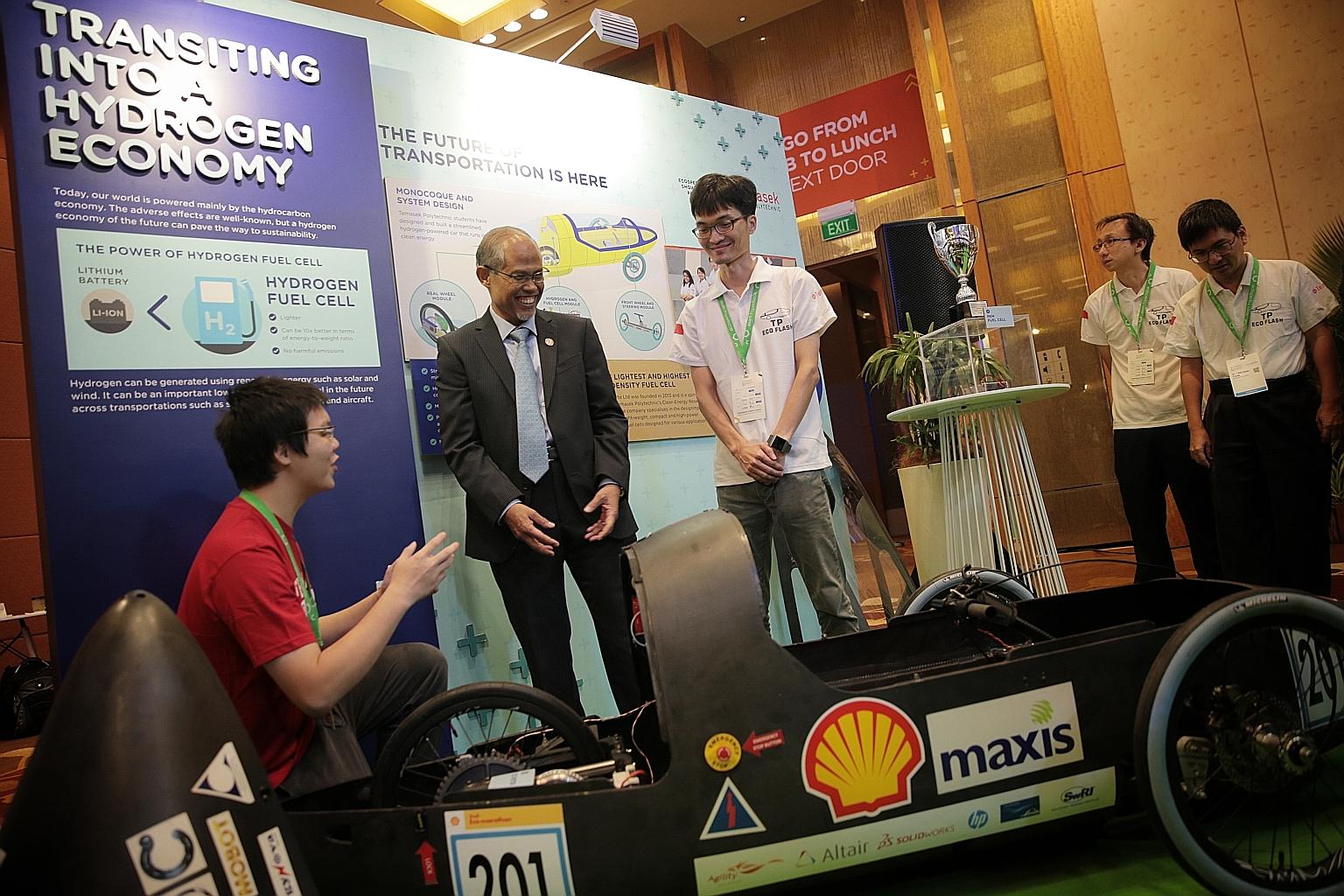PUB plans massive floating solar panel system in reservoir
The system, to be set up in Tengeh Reservoir by 2021, will power water treatment processes
Sign up now: Get ST's newsletters delivered to your inbox

Minister for the Environment and Water Resources Masagos Zulkifli checking out a hydrogen fuel cell eco-car at Temasek Polytechnic's booth at the Ecosperity showcase yesterday. The minister announced the plan for a floating solar photovoltaic system in Tengeh Reservoir in his speech at the Ecosperity Conference. Two smaller floating solar PV systems will also be deployed at Bedok and Lower Seletar reservoirs by next year.
ST PHOTO: JASON QUAH
One of the world's largest single floating solar photovoltaic (PV) systems will find a home in the waters of Singapore's Tengeh Reservoir by 2021.
National water agency PUB is seeking proposals from companies to design, build, own and run the nation's first large-scale floating system of solar panels to power water treatment processes.
Covering an area the size of about 45 football pitches, the floating solar farm will operate at 50 megawatt-peak and can power up to 13,500 four-room Housing Board flats annually.
Two smaller floating solar PV systems, each running at 1.5 megawatt-peak, will also be deployed by PUB at Bedok and Lower Seletar reservoirs by next year for the same purpose.
Alongside the conversion of food waste into agricultural compost and the use of water sludge to produce biogas as an alternative energy source, the floating solar PV systems are yet another tool in the nation's arsenal to thrive in a resource-constrained world.
Minister for the Environment and Water Resources Masagos Zulkifli announced the project in his speech at the Ecosperity Conference 2019 yesterday as he outlined a multi-pronged strategy to strengthen Singapore's defences against climate change and build economic sustainability.
Now in its sixth year, the event hosted by Temasek, Singapore's investment company, at Sands Expo and Convention Centre in Marina Bay Sands brought together corporate leaders, policymakers and innovators to discuss ways to marry growth and sustainability.
Other events taking place during Ecosperity Week included PUB's Singapore International Water Week Spotlight, the National Environment Agency's CleanEnviro Summit Singapore Catalyst, the World Bank's Innovate4Climate conference and the FutureChina Global Forum organised by Business China Singapore, focusing on sustainable development this year.
"It is clear that the status quo in the way we consume our resources and grow our economy is not sustainable. The impact of climate change respects no geographical or national boundaries," Mr Masagos said.
Climate change continues to make itself evident, such as via the uncharacteristically warm weather last month in Hokkaido, Japan. A third of the world's arable land has been lost due to ecological changes, he said, and the effect of extreme weather phenomena will put mounting pressure on critical resources such as food, energy and water.
In his welcome remarks, Temasek chairman Lim Boon Heng said: "We cannot ignore the serious impact of climate change on our planet. We should all know by now that we are at a tipping point. The decisions we make today will matter."
He stressed: "There is no Plan B, because there is no Planet B.
"Our responsibility, and our challenge, is - for the first time in human history - to make decisions that actually begin to reverse the negative impact of human habitation on our planet."
To take on these challenges, Mr Masagos highlighted strategies Singapore has adopted to create a circular economy, where waste is minimised and transformed into resources.
There are plans in the pipeline to convert incinerated bottom ash into construction material and to segregate and treat food waste - a major source of waste here - into agricultural input on local farms.
The integrated water and waste treatment plants in Tuas Nexus, expected to be fully ready by 2027, will shave more than 200,000 tonnes a year off national carbon emissions - equivalent to taking 42,500 cars off the road - by converting food waste and used water sludge into biogas.
Mr Masagos said businesses have a key role to play. He cited DBS Bank as an example of a corporation which adopts a triple bottom line framework, looking at its environmental, social and financial impact to evaluate company performance.
DBS had previously stated that it would stop funding new coal-fired plants beyond existing commitments and increase financing for renewable energy instead.


